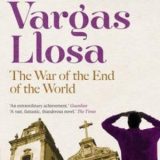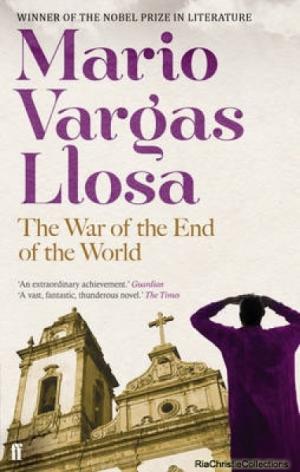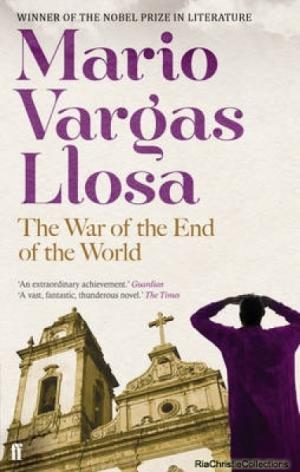The War of the End of the World – Mario Vargas Llosa – 1981
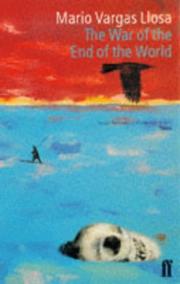
The following is a compilation of discussions and reviews from the previous version of our website. We hope you enjoy these older deliberations. Just beware, there may be spoilers in here. To add your own review or remarks, please scroll down to the comment box. — ReadLit Team
Posted by Guillermo Maynez on 6/2/2002, 13:18:15
I just finished reading The War of the End of the World (TWotEotW) and I really liked it. I am conscious that it is not an easy reading and that much of what is depicted is sordid and even gruesome, but I think that it is probably a masterpiece. As I said before, I have read other books by Vargas Llosa and I have liked them, but I believe this is his most important book.
There are different topics and possible interpretations running through the book.
The most obvious (at least to me) is the subject of religion and how it can influence the lives of people. Specifically, religion as applied to the lives of people, living in the most deplorable, unjust, sordid and miserable conditions, both physical and moral. At the beginning, I thought the Conselheiro would be the axis of the development, but interestingly, the character that starts it all remains a shadowy and mysterious figure. Many of his followers play a role much more visible and recurrent roles. So that’s, I think, the first subject for reflection: Messiahs, poverty and religion.
The second one is the subject of politics and social tensions in impoverished Latin America: corruption, feudal social structure, crime, and disorder in general. Almost at the end of the book, I had decided that the Baron of Cañabrava was to be a favourite character of mine, especially the parts when he elaborates on politics and its nature. But his last episode made him appear pathetic and somehow stained my enthusiasm for the character.
I like the book’s structure and style. It is really polyphonic and it allows the reader to roam around every single point of view. Although there are no real”protagonists,” strictly speaking, you can see that every important character is complex and totally human, even the most unlikable ones. Possibly here is a third major subject: the fascinating complexities and variety of human soul and human life.
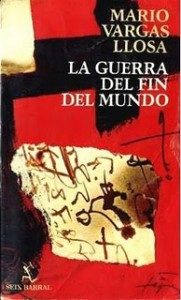
Posted by Lale on 6/2/2002, 14:12:07
What a book this was! I just finished reading it moments ago and I still can’t believe that I finished it. There were times when I was convinced that I would still be reading this book in my old age, and that it would never end. The first 100 pages were the most “hard to get through” 100 pages I ever read. But I stuck with it and I am glad I did.
The subject matter was very interesting. Based on a real event, the book covered many controversial and significant affairs, personalities, conflicts and philosophies. Brazil of the time (end of 19th century), in its every aspect, from the life style to the flora and fauna, from the politics to traditions, from the geography to climate, and from its landowners to its slaves is depicted vividly, in excruciating detail.
I can see how this book might be considered a masterpiece. It certainly has the complexity of a masterpiece. It must have taken tremendous work to construct this novel. The author, apparently worked like an architect to design all the characters, events and time frames to approach to the final war. But, as far as I’m concerned it was not a masterpiece in the sense that it wasn’t always smooth flowing or well connected. It certainly did contain more words, more details than necessary. Some parts of the novel just seemed to go on and on, even after the reader “gets the point”. The complexity of the book sometimes reaches the point of a chaos.
If I was the author of this book, I would have included (at least in the translated editions) a map of Bahia, with special details of Canudos and the surrounding areas. The many small towns (with Portuguese names that are hard for the non-native reader to keep in mind) made it very confusing for me. There is such a medley of locations that one cannot remember if the Small-Town-X was in the East of Canudos or in the West of Canudos. Was that the place where the soldiers were approaching from or was that the place where the jagunços were building the trenches? Not that it mattered much. Sometimes I suspected some editorial mistakes but I could never verify if I was right or wrong, who would want to go back and re-read, re-construct the jumble of the fighting with all those names of people, names of places? A moment ago Abbot Joao was here, how did he end up there? Never mind. It was a good narration of the war. I did *feel* the war. That’s what matters.
Like Guillermo, I too, had the inclination to feel sympathy towards Baron de Canabrava but the x-rated episode at the end of the book was totally out of place. It just didn’t fit in. Earlier, I was already critical of the implication of a relationship between Estela and Sebastiana (again, it had no relation to the course of the story), but later on when I read the out-of-the-blue scene at the end, I thought the author had really lost it there. I cannot understand why that scene was put in there. It can’t be to “hollywoodize” the novel, who is going to read 500 pages of relentless war for one page of cheap sensation? Anyway.
The characters were truly remarkable, they each deserve analysis: Galio Gall, Nearsighted Journalist (did he have a name, btw?), Epaminondas Gonçalves (I looked it up before writing it), Jurema, Dwarf, Rufino, Caifas, Lion of Natuba, Big Joao etc. I will try to say a few words about each of them when I come back to this discussion again, later on.
One of the most important themes of the book, I think, was the survival. Nature has hardwired us to do our best to survive at all costs. How most of the characters continued to live under the most difficult, unspeakable conditions was the amazing and yet natural aspect of living creatures. This point was very smartly delivered.
That’s all for now, more later. I will leave you with this quote of Sunday Telegraph, printed on the back cover of the book: “…captures the confusion of battle and the dizzy incomprehension of those involved.”
~
Posted by Anna van Gelderen on 6/2/2002, 15:37:09
Here are my first impressions on TWotEotW.
Guillermo and Lale, I agree with you that this is a well-written and important book. Even so, I found the abundant battle scenes and the political interludes hard going, but that is a matter of personal taste: I always lose interest when I read about war or politics. The book also left me rather depressed, but that too is not meaning to say that it is not a good book. On the contrary, it means that it has had quite an impact on me. I especially found the life stories of those that flocked to the Counselor very interesting and very poignant.
Just like Guillermo, I would not call this novel an easy read. The book constantly changes perspective: from one person to the other, from one place to the other and even the chronology is not linear. This means that I had to concentrate all the time: it was impossible to just drift along with the storyline. But this device also gives the book its richness.
It was obvious that the Baron was, for most of the book, meant to be one of the good guys. He is cultured, affable, intelligent. But that is just a smokescreen. I must confess that I never really liked him: he is blind to the plight of the people outside his own class, he sees his servants and his tenants as his possessions and as such has an affection for them that other people have for horses or dogs, but he never sees them as human beings like himself. And it is of course the feudalism represented by him and his class that has indirectly created Canudos. Without centuries of feudalism there would not have been such an enormous mass of the destitute and the desperate. I was therefore not surprised by the disgusting rape scene near the end. It shows the other side of this “urbane and reasonable” man.
Most of the people in Canudos are either outcasts or extremely poor. They have nothing to lose. The Counselor for the first time in their lives gives them the feeling that they are human, that they matter, that their lives can have meaning. He is a charismatic figure. In a way, he reminded me of Bin Laden: both appeal so irresistibly to the underdogs of this world that people are willing to do anything for them. Of course the Counselor does not plot mad horrendous attacks on the rest of the world, but the parallel may be interesting if we want to try to understand the appeal of Bin Laden. It also goes to show that literature is universal for everybody everywhere.
The Counselor is certainly the most enigmatic figure in the whole novel. The author allows us glimpes into the minds of all sorts of people, but of the Counselor we get to know nothing. We don’t know what drives him, what made the kind of person he is. (Note: I read on the internet that he was born in 1830 and started to wander in 1860 after his wife ran off with a soldier). His preachings are somewhat confused and based for a large part on ignorance: he maintains for instance that the republic wants to reintroduce slavery and that the metric system (!) is the work of the Anti-Christ. But his message is not really that important. It is his asceticism, his selflessness and his humane attitude towards the very poor, the deformed, the freaks and the very bad that make him special. His achievement is tremendous, almost miraculous: he manages to turn a ragged bunch into an ordered, self-sufficient community where everybody is treated the same and where those who have never been loved find love, even the near-sighted journalist who does not have a name (why not??).
I was struck by the ignorance of both sides. Each side demonizes the other. The inhabitants of Canudos call their enemies Protestants and Freemasons and dogs, and those fighting them are convinced that they are the agents of the English. The hatred and the lack of respect for “the other” that we see everywhere in the book is chilling. It was what the final scene was all about, I think, with the “Bandit-Chaser” utterly humiliating the man who so utterly humiliated his men, both sowing hatred upon hatred upon hatred. In view of this ending it seems to me that the author has rather a dim view of mankind.
~
Posted by Lale on 7/2/2002, 13:14:33
Galileo Gall: I desperately wanted to like Galileo. I wanted him to reach Canudos and do whatever it was that he wanted to do up there. He disappointed me. I think his untimely demise started to take shape ten years earlier when he had that unwise talk with his friend who was violating young girls. They made a pact of abstinence. Galileo thought that it would enhance his idealistic essence, just like monks or other religious people who have given themselves body and soul to a cause. But it didn’t work for Galileo, did it? From the novels perspective, of course he had to die before reaching Canudos because, in fact, he had absolutely nothing that he could do up there. He would spend his time just like Jurema, Dwarf and the nearsighted journalist did. Maybe it was better for him to die in a tooth-for-tooth, eye-for-eye fight than to be a complete failure as he would be up in Canudos.
Epaminondas Goncalves: Your typical, scum of the earth type politician who exists in every country on earth and who has continued to exist throughout the history. He would do anything for power, for political gain. He managed to fool our idealist Galileo Gall. In the end he won, he did beat his arch rival Baron de Canabrava.
Nearsighted journalist: He was the only charming person in the novel, in spite of all the depictions of him (mostly by the Baron) as a disgusting, pathetic weakling. When he and Lion of Natuba are left alone in the sanctuary, the nearsighted journalist displays the worst in himself. He is disgusted by the sight of Lion (although to get there he had hold on to Lion’s hair and begged him not to leave him behind), doesn’t want to be categorized together with such a “freak”, doesn’t want to die with him, he thinks himself superior to Lion. He knows that if the soldiers come in, he will try to save himself by sacrificing Lion. That scene in the sanctuary is a very negative, dark perspective on the journalist. He is, after all, human just like all the others in Canudos. Most everyone in Canudos, at one point or another confess (to themselves, or to those around) having thoughts of hate, disgust, doubt, unforgiving and less than total submission to Father. That is realistic, it couldn’t have been otherwise.
Moreira Cesar: There is a Turkish proverb that applies to him: “Never feel smug of your good life (good fortune) before you see your last day.”
No mercy was asked or given on either side.
Just one of many engrossing and sad episodes of history.
~
Posted by A.J. on 7/2/2002, 16:20:59
I finished the book not long ago, and the image of the Counselor continues to haunt me. It’s interesting that not much about his personality is revealed; he seems like a quiet, gentle person who happens to be extraordinarily charismatic and persuasive, and that’s why he tends to attract the most wretched people who are looking for redemption or a new way of life. Maybe it’s their superstition in religion that leads them to think he is truly their savior; after all forms of government have failed them, here comes a renegade priest who gives them something to hate, something to rebel against, something to believe is their downfall and cause for misery, and so it’s no wonder that they flock to him. Their devotion to him is not only not only fanatical but absolutely grotesque, especially when you consider what they do to his excrement while he’s dying. A reviewer on Amazon said that you can see the same seeds of rebellion in the jaguncos as in a lot of other terrorist or rebel groups throughout the world; I have to agree that this is an excellent portrayal of that mentality.
As for the nameless journalist, he might have been nameless probably because Vargas Llosa wanted to show that other people, especially Goncalves and the Baron, considered him a nobody; or maybe because, like Ralph Ellison’s Invisible Man, Vargas Llosa wanted him to be universal. I think the answer may be somewhere between those two extremes. It could be that Vargas Llosa saw a little of himself in the journalist; I certainly saw some of myself in him.
What else? Well, I loved the battle scenes, and while I was reading the novel I thought of Hemingway at times. I will certainly look for more of Vargas Llosa’s work.
~
Posted by Lale on 7/2/2002, 20:37:30
: especially when you consider what they do
: to his excrement while he’s dying.
Yes, they took communion, there were his words in it that would pass onto them. Although I am usually very prissy and of the opinion that we don’t have to read/write about just anything and everything, this act did not surprise me at all. It seemed like the kind of thing fanatics would do.
The tender moment between Abbot Joao and Catarina (?) was a little too realistic. Catarina eliminating the lice in Abbot Joao’s hair, and Abbot Joao trying to kiss her with his mouth that has only one tooth left in it.
: As for the nameless journalist, he might have been nameless
: probably because Vargas Llosa wanted to show that other people,
: especially Goncalves and the Baron, considered him a nobody;
: or maybe because, like Ralph Ellison’s Invisible Man, Vargas Llosa
: wanted him to be universal. I think the answer may be somewhere
: between those two extremes. It could be that Vargas Llosa saw a
: little of himself in the journalist
I agree. He was made out to be the anonymous voice, the one that finally told the story, wrote the truth. And definitely part of the author in him… Vargas Llosa ended up writing about Canudos… I often thought that he was in part the author himself.
One discrepancy though: The journalist told the baron that only 7 people survived/escaped. But in the end it was 8, no? Journalist, Jurema, Dwardf, the two Villanova brothers, their wives Sardelinha sisters, and later on the pyrotechnist.
Did you suspect that it was on purpose that the pyrotechnist was miraculously overlooked by the soldiers when every other lying body around him was getting the coup de grace? I thought it was that Colonel who liked fireworks had a part in his survival.
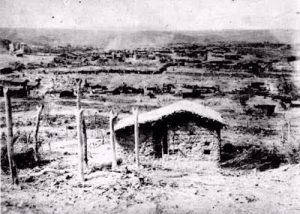 burning of Canudos
burning of Canudos
Posted by Anna van Gelderen on 7/2/2002, 21:23:05
Isn’t it interesting that one of the very few people who are not blinded by fanaticism, ignorance or ideology is this journalist who can barely see a thing without his glasses? And that in the end he is the only one who is able to see what has really been going on or is at least willing to look at things objectively? That in spite of his near blindness he could see that there was no English/monarchist plot, where his fellow journalists “saw” evidence of it everywhere? It just goes to show that there are very different ways of seeing the world and that preconceived notions and appearances can get seriously in the way of understanding.
~
Posted by A.J. on 7/2/2002, 22:35:23
To be honest, I didn’t notice that detail about the pyrotechnist. When the journalist told the Baron that only 7 people escaped, maybe he meant 7 others beside himself.
As far as who really escaped Canudos, I thought that Vargas Llosa left it up in the air whether Abbot Joao escaped or was killed. The Colonel was looking for him, because he remembered Joao to be the son of a man he had killed many years ago. At the end of the novel the Colonel asks the blind old woman if she knew where he was, and she responds that “angels took him to heaven, I saw them.” I thought that was an interesting way to end the novel, and Vargas Llosa was being purposely vague about what ultimately happened to Joao.
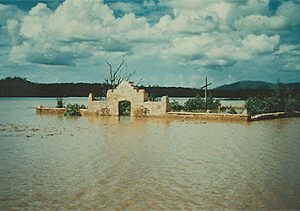
the old town of Canudos is under the waters of Lake Cocorobó
Posted by Dave on 8/2/2002, 5:33:51
Here I am, the first to finish the book… the last to comment on it. It’s been a month since I set it aside so I’ve read all your comments to refresh myself. There is such a great discussion going that I do not know what I can add to it, except to say that overall I enjoyed TWotEotW, reading it over the holidays mostly. At first I was intimidated by the size of the book and the names. I had instant recollections of One Hundred Years Of Solitude, where there is SO MUCH repitition of names (the Segundos and Buendias that all have the same first names). But this one wasn’t bad at all in that respect. I liked Anna’s comment about how Vargas Llosa tends to change perspective, sometimes it was unnerving, maybe confusing, but once I got used to it I agree that it added a richness to the book. And that style (making full use of forward and reverse gears between chapters) makes for a longer book. The author backs up and shows what WAS happening elsewhere. Some might feel it dragging, my personal view is that I have the time to appreciate it. Not all readers do.
One of the really important things that Vargas Llosa does here is show that it is impossible for those outside Canudos to understand what Canudos IS! Why it exists! Of course, those inside Canudos also have their misconceptions of what the republic would force upon them if they were to submit to it. But really, throughout the book, who is the reader sympathetic to? Isn’t there a feeling evoked that makes you, the reader, say… “Why don’t they just let these people do their thing?” Let them believe what they want to believe. Even if they’re nuts. They aren’t harming anyone are they? But, of course, their setting up of this self-contained kingdom cannot be tolerated by the advancing political aims of the country as a whole. And so it must be suppressed. But throughout the book, I had the sense that Vargas Llosa fairly represented the EXTREMES of both sides, always maintaining a slight leaning toward Canudos as something that should have at least had some sort of right to exist. Both sides of the conflict had their extremes. For instance, the communion service with the Counselor’s excrement (as someone has already noted). Fanaticism for sure. But, what of Colonel Moreira Cesar? Was he not also a fanatic? I thought he was near insane in his bloodlust and cruelty. I was glad when he was riddled through with holes, and only felt bad for his horse. There were moments when the author leans toward Canudos as almost a more authentic way of living true to one’s convictions. There is the scene (part IV ch.III) where the soldier Teotonio Leal Cavalcanti wrestles with the disillusionment of his patriotic ideals. He observes that men on the field are robbing fallen comrades for their money. Contrast this with the jaguncos who don’t even consider the wallets of dead ENEMY soldiers as booty! I just saw it as interesting how that it’s never the insiders of Canudos that question their own motives, yet everyone on the outside does (except maybe M. Cesar). And no-one does this moreso than the near-sighted journalist (both inside and outside Canudos), Baron de Canabrava, and toward the very end, General Oscar. To me, the journalist and the Baron are the most SANE of any characters in the book. They have the greatest reasoning faculties. At one point they are having a discussion, and the journalist says that Canudos is “not so much a story of madmen as a story of misunderstandings.” Princess Isabel granted the slaves their freedom, and those in Canudos shared the conviction that the Rupublic would restore slavery. This was maybe the greatest misunderstanding held, and also explains why so many former slaves and other disenfranchised types inhabited Canudos. Later on, General Oscar reflects on the experience of Canudos. Is it a war, or a religious conflict? It pains him greatly that he overhears the rosaries, sees the processions, and observes the living evidences of profound faith amongst these that are supposed to be apostates, heretics, and profaners of the true church. After killing so many of them, this great military leader lies in his hammock and asks himself “What is the explanation of Canudos?” Hereditary defects? Racial inferiority? Lack of education? Blind fanaticism? A predisposition to barbarism? Mere religion? We read that “he finds none of these explanations satisfactory.”
Like many of the characters sent to destroy Canudos, I too, feel that its inhabitants were what can be described as fanatics – those “marked or moved by excessive enthusiasm and intense uncritical devotion” (Merriam-Webster). But my opinion, and theirs, is of no account in the light of one of the main things that this novel demonstrates. Temporal power cannot destroy that which is perceived as eternal. It just can’t. It can only destroy other temporal things. That is at least one of the big things that this book says to me. There is such a thing as a personal faith (even if misguided) which cannot be destroyed by any other power that seeks to displace it. It’s right there on the last page. What happened to Abbot Joao? “Archangels took him up to heaven,” she says, clacking her tongue. “I saw them.”
~
Posted by Lale on 8/2/2002, 9:28:44
: throughout the book, who is the reader
: sympathetic to? Isn’t there a feeling evoked
: that makes you, the reader, say…
: “Why don’t they just let these people
: do their thing?” Let them believe what
: they want to believe.
Yes, if the reader has to pick a side, I am sure most would be inclined to support the Canudos side. I found myself wishing that they would yet again upset the soldiers against all odds. And, I, a person who absolutely detests religious (or otherwise) fanaticism.
In United States there were incidents similar to this, WACO, for example. But in all those hold-outs there were reports of children being abused or people being held against their own will. Now, the government of Brazil could have made a case of child abuse or other human rights being violated in Canudos, but the fact is the government had nothing better to offer to them. The goal of the expeditions was not to “save” the people of Canudos but to save the republic from them by destroying them.
According to one account this is how the problem started:
“As families moved to Canudos, it became the second largest city in Bahia. Trouble started over a shipment of building materials that was paid for and not delivered, according to the Counselor, or not paid for and taken, according to local authorities. Anyway, soldiers were sent to either repossess the materials, get payment or punish the Counselor’s band. This was the first of 4 or 5 expeditions sent against Canudos by authorities.”
: Fanaticism for sure. But, what of Colonel
: Moreira Cesar? Was he not also a fanatic?
Oh, absolutely. He was a fanatic. A mad man. I was not sorry for him either.
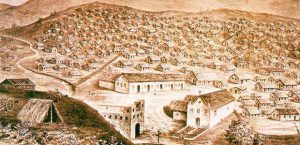 Canudos, an illustration
Canudos, an illustration
Posted by Guillermo Maynez on 9/2/2002
I basically agree with your opinions about the characters. Certainly the nearsighted journalist becomes the axis of the narration and the character closest to objectivity.
About Canudos, I think that you forget their raids to rural properties, which they burned and destroyed. One of the problems with Canudos is that it is NOT simply a peaceful community. Remember that the wife of Baron de Cañabrava loses her reason since she sees Pajeú and his people burning her property to the ground. This is the incident hatt really destroyed Cañabrava’s existence. In spite of the terrible last scene in which he appears, I still like him best in the novel. I think his love for his wife Estela is absolute and true and the last scene is ugly but probably necessary to show that we all have our demons (hopefully dealing with them more effectively).
~
Posted by Lale on 10/2/2002, 14:27:44
Lion of Natuba has a very large head. He is seriously deformed. His legs are too short and he has a hunch on his back, therefore he can only walk on all fours. “… his head became so monstrously large that it seemed like a miracle that his frail little body could hold it up …” Lion of Natuba learns how to read and write on his own. ” … he could be seen at any hour of the day hunched over in the shade of the blue jasmine trees of Natuba reading and rereading newspapers, prayer books, missals, edicts, and anything printed that he could lay his hands on.”
What makes Lion of Natuba want to read anything printed that he could lay his hands on? I think he was a natural-born intellectual.
Later on, in Canudos, he has a chat with the nearsighted journalist:
“I’ve read the Abbreviated Missal and the Marian Hours many times. And all the magazines and periodicals that people used to bring me in the old days. Over and over. Have you read great deal too, sir?”
…
“I know what electricity is, if you like, sir, I can teach you what it is. And in return, sir, you can teach me things I don’t know. I know what the principle or the law of Archimedes is. How bodies are mummified. The distances between stars.”
Intellectuals: “broadly defined as those with the will to learn and strive for knowledge.”
Lion of Natuba never went to school and never saw an intellectual in his life, he did not even had a proper book to read. He certainly did not have a role model. But he did have the will to learn and he did strive for knowledge. Not all children strive for knowledge. What makes some kids want to learn and what makes the others indifferent to knowledge?
Posted by Dave on 11/2/2002, 4:58:56
Does it have something to do with a sort of innate ability to focus?
I personally believe that if it is not something that is developed early on, it rarely develops later on.
Coupled with an introspective nature, I think intellectuals also have an appreciation for knowledge as an end in itself. I think that the act of “knowing” must trigger something (maybe even it is a neuro-chemical thing) for an intellectual… it is like a “fix”. And many other people do not get the same sort of “kick” out of the same (cerebral) information, or means of attaining it. We, as avid readers, tend to think of intellectualism as being always associated with READING… but Tim’s definition begs the following question: What of those who have the “will to learn and strive for knowledge” and yet dislike reading? Is that person an intellectual? Say their only interest is mathematical? Or… their “will to learn and strive for knowledge” works itself out by buying a bunch of planks and woodstain, and building a deck on the rear of the house? Or by building a skyscraper? Or a better airplane? Or a tastier cake? See… a lot of people can really relate to the “practical” realm of knowledge, while despising the idea of knowledge being an end in itself. Knowledge has to work itself out in something visible (concrete) for it to have value for them. They may strive for their concept of “knowledge” almost as a way to AVOID intellectual activity. I think that an intellectual is someone for whom this pragmatic factor is not an issue. The dialogue that goes on in the mind when encountering new information IS ENOUGH. It does not have to become a cake. My opinion? An intellectual may be able to build a deck, but building a deck, does not an intellectual make! Intellectuals are people who are familiar with others asking them “What good does it do you to read __________?” (fill in the blank). I remember my father going into an incoherent rage once because I told him I had just finished reading Othello.
The Lion of Natuba is definitely an intellectual in these ways I’m describing. I found the character of this hairy quadrumane endlessly interesting. All true learning requires a certain amount of disciplined self-motivation, if for no other reason then that all true learning is done individually. Vargas Llosa told us a bit about the Lion’s history… how he would read anything he could get his paws on. Why did Lion do this? Again, it’s almost unexplainable… some sort of neuro-chemical jolt that he was getting from a scrap of newspaper, or a book. For whatever reason, others lack this dependency.
The truly remarkable thing about the Lion is that, coupled with this intellectualism was such a radical religious fervor. Because this is not a common combination. I recently (last year) read William James’ excellent book “The Varieties of Religious Experience” and remember these observations he made:
“The fruits of religion, are, like all human products, liable to corruption by excess. Common sense must judge them.” P.332.
“We find that error by excess is exemplified by every saintly virtue.” P.333.
“In the life of saints, technically so called, the spiritual faculties are strong, but what gives the impression of extravagance proves usually on examination to be a relative deficiency of intellect. Spiritual excitement takes pathological forms whenever other interests are too few and the intellect too narrow.”
All of the above from “Varieties Of Religious Experience” p.332-333.
Interesting. This “intellectual” Lion. Was he among the excrement eaters? Before I sound as though I am deriding the intellectual/spiritual connection, let me say that I happen to personally believe that there is no higher or more worthwhile form of intellectual contemplation than that which conjoins the “mind” and the “spirit” of a person. It’s just that historically and numerically, it is possible to demonstrate that too often, “religious” thinking is synonymous with “uncritical” thinking. Those who are religious “geniuses” DO EXIST however. Often though, like the Lion, they may appear to be almost mentally ill in some ways. Again, in the first chapter, James discusses the idea that the type of people who seem to have had the most profound spiritual experiences, especially as regards divine revelation, tend to demonstrate peculiarities “which are ordinarily classed as pathological”. (p.8) And further, “But such individuals are `geniuses’ in the religious line; and like many other geniuses who have brought forth fruits effective enough for commemoration in the pages of biography, such religious geniuses have often shown symptoms of nervous instability.” (p.8) And on page 26, he says “What, then, is more natural than that this temperament should introduce one to regions of religious truth, to corners of the universe, which your robust Philistine type of nervous system, forever offering its biceps to be felt, thumping its breast, and thanking Heaven that it hasn’t a single morbid fibre in its composition, would be sure to hide forever from its self-satisfied possessors?”
There is no more subjective sub-category of “truth” than that which can be described as “religious truth”. Therefore, some will be led to their concept of “it” through intellectualism, others will be led there through a LACK of intellectualism. How was the Lion led there? Vargas Llosa seems to suggest that it was a sort of combination of the two, which I personally believe is the healthiest way to get there.
How can we possibly unravel the intricate reasons why one person ends up intellectually motivated… and another from the same womb, same upbringing… does not, and, in fact, learning is a real chore for them. And it’s not just a matter of READING either. It’s a matter of appreciation. There is an episode of the Simpsons where a cynical couple sit on a park-bench facing west, looking at the sunset, and one of them verbalizes their mutual complaint… “Could it be any more orange?” An intellectual would never say such a thing. On the contrary, an intellectual marvels at the fact that there are supposedly nine galaxies for every person on the face of the earth.
The following example proves that it is literally impossible to predict WHO becomes an intellectual. One was born on June 27, 1880, in Tuscumbia, Alabama. Nineteen months later an acute illness nearly took her life and left her deaf and blind. Her name? Helen Keller. An intellectual of whom the world was not worthy.
A Brief Presentation on Canudos
and
Mario Vargas Llosa’s The War of the End of the World
by Lale Eskicioglu
Bahia Province, Brazil / 1892 – 1897
- a rebel, communal town formed around an abandoned farm called Canudos (Straws)
- 25 -30,000 residents
- 15,000 killed in the War of Canudos – Massacre of Canudos
- by a government campaign of the newly-founded Republic (1889)
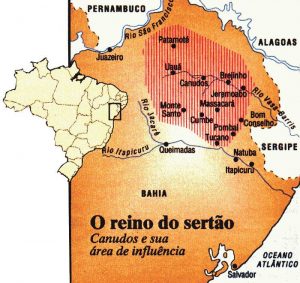 Canudos is established around river Vasa-Barris
Canudos is established around river Vasa-Barris
Euclides da Cunha
Journalist, sociologist and engineer.
Eye witness to the Massacre of Canudos.
He wrote his experience in Rebellion in the Backlands – Os Sertões
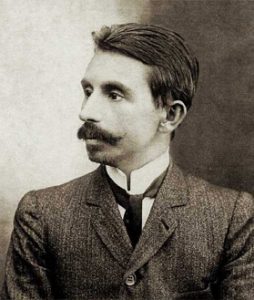
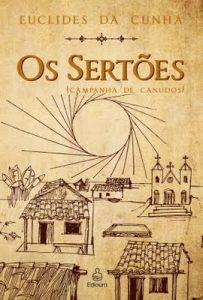
Mario Vargas Llosa’s novel, The War of the End of the World (1981) is based on Euclides da Cunha’s Rebellion in the Backlands, and dedicated to him.
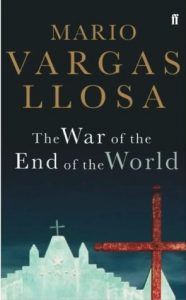
Antonio Conselheiro (1830 – 1897)
Salesman, teacher and lay counselor (poorman’s lawyer).
Retired to a farm, started to work as a rural teacher, and devoted himself to Christianity and preaching.
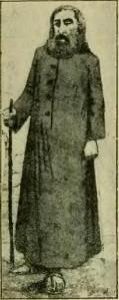

- Becomes disillusioned with society
- Becomes restless
- Increasingly drawn to Christian mysticism
- Stars travelling on foot, preaching and repairing churches
- A following forms, and they travel together
- They come upon an abandoned farm in the area known as Canudos
- They start a settlement
- They start building mud and straw homes, and a church (across from an old church which was already there)
- They create a communal life
- They are against the newly-found republic (although they are believed to be monarchists, they are not that either)
- They come to be known as rebels.
“…the saint who had wandered the length and breadth of the land for quarter of a century had to put down roots in that place surrounded by stony hills called Canudos.” (48)
“The place was known to cowhands, for they often stopped with their cattle for the night on the banks of the Vaza-Barris. In the following weeks and months groups of the curious, of sinners, of the sick, of vagrants, of fugitives from justice, come from the North, the South, the East, and the West, were seen heading for Canudos with the presentiment or the hope that they would there find forgiveness, refuge, health, hapiness.” (49)
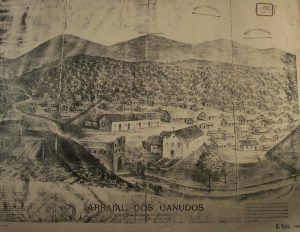
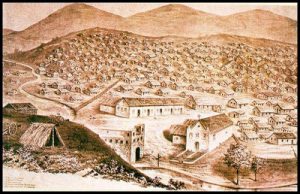
How did the town function?
“in Canudos humble and inexperienced people, by the sheer powers of instinct and imagination, are carrying out in practice many of the things that we European revolutionaries know are necessary in order to institute a reign of justice on this earth.” (attributed to Euclides da Cunha, the eye witness journalist, The War of the End of the World, page 46)
The town had: 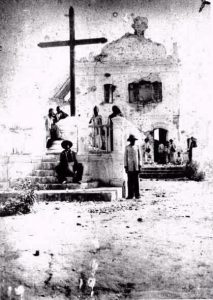
- A church (the old church), and a new one (Temple of the Blessed Jesus) was being built.
- A storehouse “to store the food and see to it that it was distributed fairly among the destitude.” (50)
- Health Houses “where lodging, food, and care began to be given to the sick, to old people, and to orphaned children.” (52)
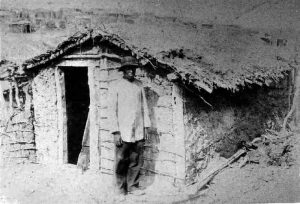
mud and straw houses
Utopic aspects of Canudos:
- Regime of communal property: Everything belongs to everyone. The Counselor says: “It is a sin to consider any movables or semimovables as belonging to any one individual. The dwellings, the crop lands, the domestic animals belong to the community: they are everyone’s and no one’s.” (48)
- “all children are legitimate by the mere fact of having been born.”
- “the people of Canudos have taken to forming unions freely and to dissolving them freely, so long as both the man and the woman agree to do so.” (45)
Community Life:
- “in general, life was peaceful and a spirit of collaboration reigned among the inhabitants.”
- “Raw brown sugar was exchanged for rope sandals, chickens for herb cures, manioc flour for horseshoes, roof tiles for lengths of cloth, hammocks for machetes, and work, in the fields, in dwellings, in animal pens, was repaid with work.” (51)
- “The life of the community was devoted to spiritual activities: prayers, funerals, fasts, processions, the building of the temple … and above all the evening counsels that often lasted until far into the night.” (52)
New Republic’s Reaction:
Newly-found United States of Brazil felt threatened by Canudos.
- Rebels, revolutionaries, criminals, monarchists, separatists – they want to throw away the Republic. They are trying to establish a new nation.
- They are squatters. The Baron wants his land back.
The Church backed the New Republic on this because the religious establishment was also intimidated by the Counselor.
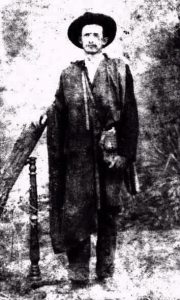
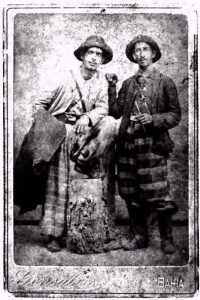 combatants
combatants
Canudos infantry battalion 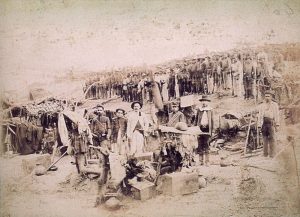
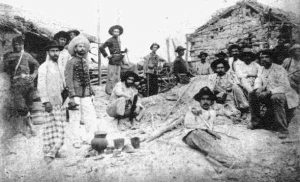
War of Canudos:
- 4 Military campaigns
- Bigger and bigger military expeditions to Canudos
- First three campaigns are huge defeats for the government. Both sides incur massive losses of life. In the fourth campaign, Canudos was circled and relentlessly bombarded.
“Isolated both in space and time, the jagunço could only behave as he did. He was compelled to put up a terrible fight against the country that, after having ignored him for three centuries, tried to civilize him at gunpoint.” (Euclides da Cunha, Backlands: The Canudos Campaign, pages 280-281)
Da Cunha estimates the death at 30,000: 25,000 from Canudos and 5,000 of the attackers.
The city is burned, demolished, razed to the ground.
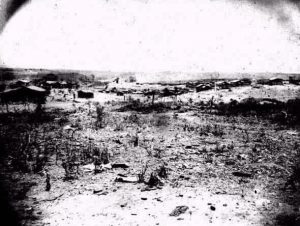
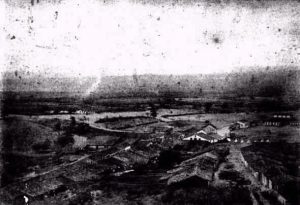
Straws homes on fire in the background. Nothing would be left of the old town.
Soldiers and conselheirista arrested.
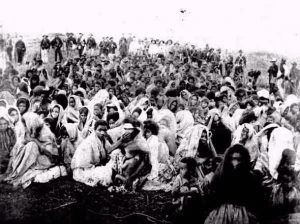 prisoners of war
prisoners of war
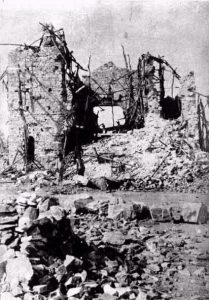 ruins of the church
ruins of the church
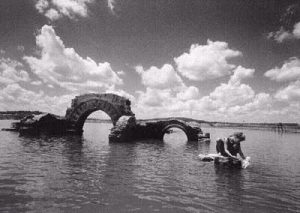
ruins of the church under the waters of Lake Cocorobó
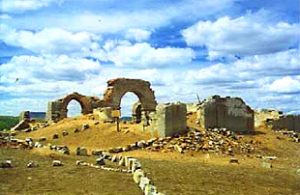
in 1996, when severe drought made archaeological studies possible
New Canudos and the cultural revival project:
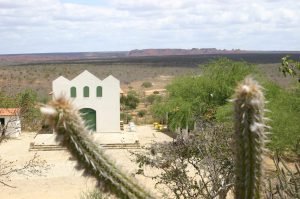
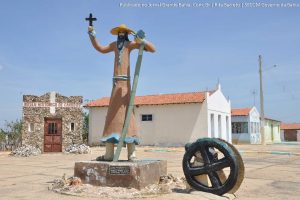
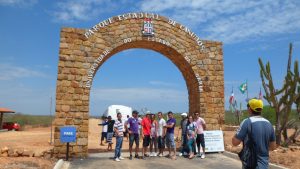 Canudos State Park
Canudos State Park
Canudos Today:
A quiet town with structured layout and straight roads. It is located 410 km outside of Salvador near the Cocorobó Dam.
Created in the 1980s.
13,800 inhabitants.
“But the story of the town belongs to the last century.”
Sources:
“Canudos never surrendered.” http://bahia.com.br/en/
Della Cava, Ralph. “Brazilian Messianism and National Institutions: A Reappraisal of Canudos and Joaseiro.” The Hispanic American Historical Review [0018-2168] yr:1968 vol:48 iss:3 pg:402 -420. Web. 2 Apr. 2014.
“Guerra de Canudos.” http://www.girafamania.com.br/montagem/fotografia-brasil-guerra-canudos.htm
Johnson, Adriana. “The War of the End of the World or the End of Ideology.” Journal of Latin American Cultural Studies Vol. 13, Iss. 2, 2004. Web. 2 Apr. 2014.
Vargas Llosa, Mario. The War of the End of the World. London: Faber and Faber, 1985. Print.


